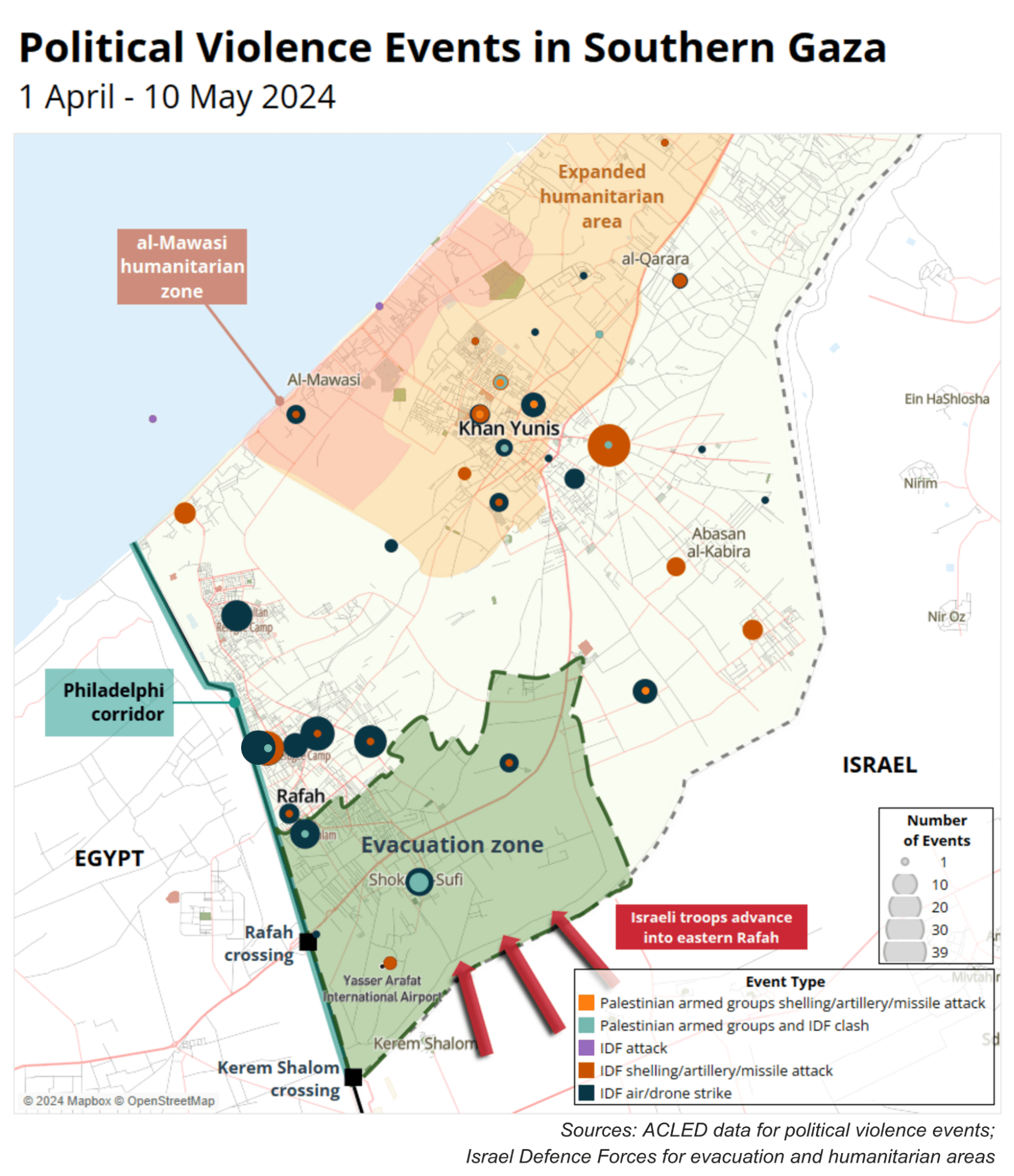- Israeli military launched airstrikes in Gaza, targeting buildings described as Hamas command centers and issued new evacuation orders for parts of northern Gaza (NYTimes.com).
- In Jabaliya, Gaza, Israeli forces encircled the area, citing Hamas efforts to rebuild, and launched a new ground offensive (CNN.com).
- Airstrikes targeted sites in southern Beirut, Lebanon, in response to Hezbollah’s involvement, amid concerns of wider regional escalation (TheGuardian.com).
- The IDF has carried out several evacuations of Palestinian civilians from northern Gaza, signaling increased military pressure on Hamas (JPost.com).
- Israeli airstrikes and military operations intensified in both Lebanon and Gaza ahead of the anniversary of the October 7 Hamas attacks (Independent.co.uk).
From this viewpoint, Israel's airstrikes and ground operations in Gaza and Lebanon are seen as a necessary and justified act of self-defense against Hamas and Hezbollah, both militant groups supported by Iran. These groups have posed ongoing security threats to Israel, with rocket attacks and militant activities prompting the Israeli Defense Forces to take decisive action. The strikes on command centers, weapons caches, and militant hideouts are viewed as legitimate military targets aimed at neutralizing terror infrastructure and preventing further civilian harm to Israeli citizens.
From this perspective, Israel's actions in Gaza and Lebanon are seen as disproportionate and a violation of international law, particularly with regard to civilian casualties and attacks on non-combatant sites such as mosques, schools, and residential areas. Critics argue that while Israel claims to target Hamas or Hezbollah, the civilian toll, including children and displaced families, makes the operations tantamount to war crimes. Human rights organizations emphasize that Israel has not provided adequate evidence for its claims about militant presence in civilian locations, thus putting non-combatants at risk and causing significant humanitarian crises.
A third perspective focuses on the broader geopolitical implications of Israel's military actions, viewing them as part of an escalating regional conflict involving Iran, Hezbollah, and Hamas. With tensions rising on multiple fronts, including missile attacks and counterstrikes, there are concerns that the conflict may spiral into a wider war involving more countries in the Middle East. This perspective highlights the role of proxy warfare, with Iran's backing of Hezbollah and Hamas, and underscores the potential for further destabilization of the region if diplomatic solutions are not pursued.
Details
Security
Bias
Deltas
The ongoing conflict between Israel, Hamas, and Hezbollah has escalated in recent days, drawing in broader regional actors and increasing tensions across the Middle East. Israeli airstrikes in Gaza have intensified, with Israeli forces targeting areas in the northern Gaza Strip and southern Lebanon, according to NYTimes. The Israeli military claims that the strikes targeted Hamas “command and control centers” embedded in civilian areas, such as mosques and schools, though critics argue there is insufficient evidence provided to substantiate these claims. Gaza's Health Ministry reported that dozens of Palestinians have been killed as a result of these attacks, though the ministry does not distinguish between civilian and militant casualties, according to NYTimes and WSJ. This escalation comes on the eve of the anniversary of the October 7, 2023, Hamas-led attacks on Israel, an event that marked the beginning of the ongoing violence.
In addition to the airstrikes, the Israeli military has launched a ground offensive in Gaza, specifically targeting the Jabaliya refugee camp in the northern part of the enclave. The military claims that it encircled Jabaliya due to intelligence reports that Hamas was regrouping in the area after nearly a year of fighting and bombardments, as reported by Al Jazeera and WSJ. Israeli military sources noted that airstrikes have been carried out to dismantle Hamas's operational capabilities, particularly targeting military infrastructure, weapons storage facilities, and Hamas fighters. However, the airstrikes have also resulted in civilian casualties, including children, with Gaza health officials confirming that 17 people, including nine children, were killed in recent airstrikes on Jabaliya (Al Jazeera).
Simultaneously, Israel has been expanding its operations beyond Gaza, launching significant strikes in southern Lebanon targeting Hezbollah, a militant group backed by Iran. The Israeli military has focused on Hezbollah strongholds in southern Beirut, issuing evacuation orders for residents in the area while intensifying its bombing raids, according to The Guardian. The Israeli military also confirmed the presence of Israeli troops near U.N. peacekeepers in southern Lebanon, further complicating the situation by placing U.N. personnel in close proximity to active conflict zones. These strikes come in response to Hezbollah's rocket attacks on northern Israel, which have forced thousands of Israelis to flee their homes near the Lebanese border (WSJ and NYTimes).
The involvement of Iran has been a key concern, as the Iranian government is known to support both Hamas and Hezbollah. Tensions between Israel and Iran have risen following missile attacks from Iranian-backed forces, with both sides preparing for potential further escalations. Israeli Prime Minister Benjamin Netanyahu has vowed to retaliate against Iran, though U.S. officials have urged restraint to prevent a wider regional conflict (The Guardian). The prospect of a direct confrontation between Israel and Iran has heightened concerns that the conflict could spread beyond Gaza and Lebanon, with significant regional and global implications. The possibility of a retaliatory airstrike against Iran remains a key point of contention, as noted by CNN.
As the war continues, both sides have faced mounting international criticism. Humanitarian organizations have expressed concerns about the growing civilian casualties and the destruction of essential infrastructure, including hospitals and schools, in Gaza. The Israeli military maintains that its operations are precise and aimed at dismantling terrorist networks, but the scale of destruction and civilian deaths has led to allegations of war crimes, particularly in the case of strikes on shelters and residential areas. French President Emmanuel Macron has called for an immediate ceasefire and an end to arms shipments that could be used in the Gaza conflict, according to The Guardian. Despite these calls, the situation remains fluid and dangerous, with no clear resolution in sight.
The article quotes British Prime Minister Starmer’s warning about the severe consequences of a direct Iran-Israel conflict and highlights the risks of escalation in the region. The tone conveys a sense of criticism towards Israel’s role in the conflict, with phrases like 'the outrageous attack by Iran on Israel takes us to a dangerous tipping point,' putting the blame on Israel’s involvement indirectly, without portraying it as justified or necessary.
Read full article
The article discusses the growing risks of war and places Israel in the context of exacerbating these tensions, with phrases like 'on the brink of a big war.' This suggests that Israel's actions are seen as contributing to destabilization, thus portraying the country’s involvement negatively.
Read full article
The article focuses on Israel’s military operations being stuck 'in the quagmire of Gaza' and highlights criticism from Israeli sources, suggesting the country’s approach is seen as unorganized and lacking a clear objective. This coverage is more critical of Israel’s leadership and military strategies, contributing to a negative portrayal.
Read full article

The article emphasizes Israel’s military strikes on Gaza and Lebanon, pointing out civilian casualties and escalating violence. Words like 'intensified military action' and 'calls for immediate ceasefire' portray Israel’s actions as leading to severe consequences, contributing to a negative perspective on its role in the conflict.
Read full article
The article highlights the number of Hezbollah members killed by Israeli strikes and stresses the humanitarian cost of the conflict, portraying Israel’s actions as escalating the violence in Lebanon and Gaza. It takes a critical view of Israel’s ongoing military operations and their consequences.
Read full article
Negative
Sentiment
The article discusses warnings by the FBI and US Department of Homeland Security about possible violence on the anniversary of the Hamas attack on Israel. The tone remains factual and neutral, simply reporting the risks without favoring one side or critiquing Israel's role in the broader conflict.
Read full article
Neutral
Sentiment
Positive
Sentiment
-
+
Sila RF [Russia] Adds Concern Over British PM's Warning
Sila RF adds that British PM Keir Starmer warned of a direct Iran-Israel conflict and its global consequences.
This emphasis on Starmer’s warning and its global implications was not highlighted in Western articles. -
+
SB Belarus Today [Belarus] Adds Threat of Large-Scale Conflict
SB Belarus Today emphasizes the looming risk of a large-scale war in the Middle East due to Israel’s actions.
The idea of a 'big war' threatening the region was not as prominently emphasized in Western sources. -
+
REN TV [Russia] Adds Criticism of Israel's Strategy
REN TV criticizes Israel’s lack of clear goals in the Gaza conflict, adding an internal perspective of Israeli dissatisfaction.
This in-depth criticism of Israel’s leadership was less emphasized in Western media, which focused more on military actions. -
+
Baidu [China] Adds Lebanese Civilian Casualties
Baidu highlights specific figures for Lebanese civilian casualties from Israeli airstrikes, focusing on humanitarian impacts.
The death toll and displacement of Lebanese civilians was less prominent in Western sources, which focused more on military actions. -
+
Hespress [Middle East] Adds Iran’s Expected Retaliation
Hespress details Iran’s expectation for Hezbollah to strike deep into Israel in response to Israeli strikes.
This expectation of Iran’s retaliation was not emphasized in many Western reports. -
+
CNN [USA] Adds Retaliation Timeline
CNN provides a detailed timeline of Israeli airstrikes and Hezbollah’s retaliatory actions, with precise details on numbers and events.
The focus on a specific timeline of airstrikes and counterstrikes is not as detailed in non-Western sources.
-
-
New Izvestia [Russia] Omits Hezbollah’s Retaliatory Strikes
New Izvestia focuses on the death of Hezbollah leader Hassan Nasrallah but omits Hezbollah’s retaliatory missile strikes.
Western media, in contrast, provided coverage of Hezbollah’s retaliatory strikes against Israeli targets. -
-
BBC [UK] Omits Hezbollah Leadership Details
BBC omits specific details about Hezbollah’s leadership casualties and focuses more on broader geopolitical impacts.
This omission contrasts with other non-Western reports that included the deaths of key Hezbollah commanders.


